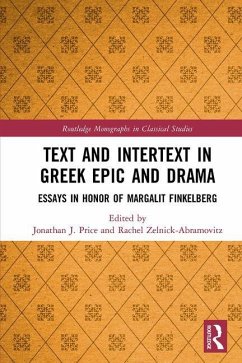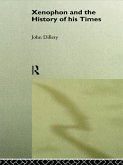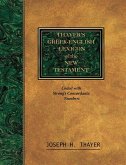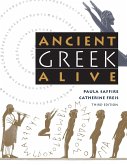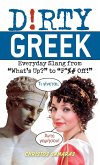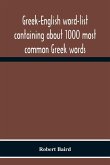Text and Intertext in Greek Epic and Drama
Essays in Honor of Margalit Finkelberg
Herausgeber: Price, Jonathan J.; Zelnick-Abramovitz, Rachel
Text and Intertext in Greek Epic and Drama
Essays in Honor of Margalit Finkelberg
Herausgeber: Price, Jonathan J.; Zelnick-Abramovitz, Rachel
- Broschiertes Buch
- Merkliste
- Auf die Merkliste
- Bewerten Bewerten
- Teilen
- Produkt teilen
- Produkterinnerung
- Produkterinnerung
Text and Intertext in Greek Epic and Drama offers a selection of essays exploring Greek epic, drama, and their reception and adaption by other ancient authors.
Andere Kunden interessierten sich auch für
![Greek Greek]() David HoltonGreek236,99 €
David HoltonGreek236,99 €![Xenophon And The History Of His Times Xenophon And The History Of His Times]() John DilleryXenophon And The History Of His Times82,99 €
John DilleryXenophon And The History Of His Times82,99 €![Thayer's Greek-English Lexicon of the New Testament Thayer's Greek-English Lexicon of the New Testament]() Joseph ThayerThayer's Greek-English Lexicon of the New Testament46,99 €
Joseph ThayerThayer's Greek-English Lexicon of the New Testament46,99 €![Ancient Greek Alive Ancient Greek Alive]() Paula SaffireAncient Greek Alive55,99 €
Paula SaffireAncient Greek Alive55,99 €![Dirty Greek Dirty Greek]() Cristos SamarasDirty Greek15,99 €
Cristos SamarasDirty Greek15,99 €![The Greek Reader The Greek Reader]() Friedrich JacobsThe Greek Reader26,99 €
Friedrich JacobsThe Greek Reader26,99 €![Greek-English Word-List Containing About 1000 Most Common Greek Words, So Arranged As To Be Most Easily Learned And Remembered Greek-English Word-List Containing About 1000 Most Common Greek Words, So Arranged As To Be Most Easily Learned And Remembered]() Robert BairdGreek-English Word-List Containing About 1000 Most Common Greek Words, So Arranged As To Be Most Easily Learned And Remembered18,99 €
Robert BairdGreek-English Word-List Containing About 1000 Most Common Greek Words, So Arranged As To Be Most Easily Learned And Remembered18,99 €-
-
-
Text and Intertext in Greek Epic and Drama offers a selection of essays exploring Greek epic, drama, and their reception and adaption by other ancient authors.
Hinweis: Dieser Artikel kann nur an eine deutsche Lieferadresse ausgeliefert werden.
Hinweis: Dieser Artikel kann nur an eine deutsche Lieferadresse ausgeliefert werden.
Produktdetails
- Produktdetails
- Verlag: Routledge
- Seitenzahl: 422
- Erscheinungstermin: 25. September 2023
- Englisch
- Abmessung: 234mm x 156mm x 23mm
- Gewicht: 638g
- ISBN-13: 9781032474328
- ISBN-10: 1032474327
- Artikelnr.: 68714140
- Herstellerkennzeichnung
- Books on Demand GmbH
- In de Tarpen 42
- 22848 Norderstedt
- info@bod.de
- 040 53433511
- Verlag: Routledge
- Seitenzahl: 422
- Erscheinungstermin: 25. September 2023
- Englisch
- Abmessung: 234mm x 156mm x 23mm
- Gewicht: 638g
- ISBN-13: 9781032474328
- ISBN-10: 1032474327
- Artikelnr.: 68714140
- Herstellerkennzeichnung
- Books on Demand GmbH
- In de Tarpen 42
- 22848 Norderstedt
- info@bod.de
- 040 53433511
Jonathan J. Price is the Fred and Helen Lessing Professor of Ancient History at Tel Aviv University, Israel, and the author of books and articles on Greek and Roman historiography, Jewish history of the Roman period, and Jewish epigraphy. Among his publications are Jerusalem Under Siege: The Collapse of the Jewish State, 66-70 C.E. (1992), Thucydides and Internal Conflict (2001), and editions of the Jewish inscriptions in Corpus Inscriptionum Iudaeae/Palaestinae: A Multi-lingual Corpus of the Inscriptions from Alexander to Muhammad, Volumes I-V (2010-2019). Rachel Zelnick-Abramovitz is Associate Professor at the Department of Classics, Tel-Aviv University, Israel. She is the author of Not Wholly Free: The Concept of Manumission and the Status of Manumitted Slaves in the Ancient Greek World (2005), of Taxing Freedom in Thessalian Manumission Inscriptions (2013), and of several articles on the status of slaves and free non-citizens, on the working of Athenian democracy, and Greek historiography.
Introduction Part I A. Epic - Text 1. Homer's Innocent Aeneas and
Traditions of the Troad 2. Formulaic Diction and Contextual Relevance:
Notes on the Meaning of Formulaic Epithets in Iliad 1 3. Babies in the
Iliad Book 6: Astyanax and Dionysus 4. Reading Emotional Intelligence:
Antilochus and Achilles in the Iliad 5. Two Mothers: Eos and Thetis in the
Aithiopis 6. Seeing the Unseen in the Iliad B. Epic - Intertext 7. The
melody of Homeric Performance 8. Helen of Troy-or of Lacedaemon? The Trojan
War and Royal Succession in the Aegean Bronze Age 9. Substitute, Sacrifice
and Sidekick: A Note on the Comparative Method and Homer 10. The Birth of
Literary Criticism (Herodotus 2.116-17) and the Roots of Homeric
Neoanalysis 11. Iopas, Vergil's Phoenician Bard (on Aeneid 1.740-747) 12.
Homer between Celsus, Origen and the Jews of Late Antique Palaestina 13
Unreportable Tokens, Speech Representation and Conventions of Textual
Composition Part II A. Drama - Text 14. Boughs and Daggers: Reading "Hand"
in Aeschylus' Suppliants and the Danaid Trilogy 15. Episodic Tragedy,
Antigone, and Indeterminacy at the End of Euripides' Phoenissae 16.
Dramatic Contexts and Literary Fiction in Euripides, Heracles 1340-46 17.
Fictions of Space from Old to New Comedy B. Drama - Intertext 18. The
Sphinx: A Greco-Phoenician Hybrid 19 Inviting Socrates: the prologs of
Republic and the two Symposia
Traditions of the Troad 2. Formulaic Diction and Contextual Relevance:
Notes on the Meaning of Formulaic Epithets in Iliad 1 3. Babies in the
Iliad Book 6: Astyanax and Dionysus 4. Reading Emotional Intelligence:
Antilochus and Achilles in the Iliad 5. Two Mothers: Eos and Thetis in the
Aithiopis 6. Seeing the Unseen in the Iliad B. Epic - Intertext 7. The
melody of Homeric Performance 8. Helen of Troy-or of Lacedaemon? The Trojan
War and Royal Succession in the Aegean Bronze Age 9. Substitute, Sacrifice
and Sidekick: A Note on the Comparative Method and Homer 10. The Birth of
Literary Criticism (Herodotus 2.116-17) and the Roots of Homeric
Neoanalysis 11. Iopas, Vergil's Phoenician Bard (on Aeneid 1.740-747) 12.
Homer between Celsus, Origen and the Jews of Late Antique Palaestina 13
Unreportable Tokens, Speech Representation and Conventions of Textual
Composition Part II A. Drama - Text 14. Boughs and Daggers: Reading "Hand"
in Aeschylus' Suppliants and the Danaid Trilogy 15. Episodic Tragedy,
Antigone, and Indeterminacy at the End of Euripides' Phoenissae 16.
Dramatic Contexts and Literary Fiction in Euripides, Heracles 1340-46 17.
Fictions of Space from Old to New Comedy B. Drama - Intertext 18. The
Sphinx: A Greco-Phoenician Hybrid 19 Inviting Socrates: the prologs of
Republic and the two Symposia
Introduction Part I A. Epic - Text 1. Homer's Innocent Aeneas and
Traditions of the Troad 2. Formulaic Diction and Contextual Relevance:
Notes on the Meaning of Formulaic Epithets in Iliad 1 3. Babies in the
Iliad Book 6: Astyanax and Dionysus 4. Reading Emotional Intelligence:
Antilochus and Achilles in the Iliad 5. Two Mothers: Eos and Thetis in the
Aithiopis 6. Seeing the Unseen in the Iliad B. Epic - Intertext 7. The
melody of Homeric Performance 8. Helen of Troy-or of Lacedaemon? The Trojan
War and Royal Succession in the Aegean Bronze Age 9. Substitute, Sacrifice
and Sidekick: A Note on the Comparative Method and Homer 10. The Birth of
Literary Criticism (Herodotus 2.116-17) and the Roots of Homeric
Neoanalysis 11. Iopas, Vergil's Phoenician Bard (on Aeneid 1.740-747) 12.
Homer between Celsus, Origen and the Jews of Late Antique Palaestina 13
Unreportable Tokens, Speech Representation and Conventions of Textual
Composition Part II A. Drama - Text 14. Boughs and Daggers: Reading "Hand"
in Aeschylus' Suppliants and the Danaid Trilogy 15. Episodic Tragedy,
Antigone, and Indeterminacy at the End of Euripides' Phoenissae 16.
Dramatic Contexts and Literary Fiction in Euripides, Heracles 1340-46 17.
Fictions of Space from Old to New Comedy B. Drama - Intertext 18. The
Sphinx: A Greco-Phoenician Hybrid 19 Inviting Socrates: the prologs of
Republic and the two Symposia
Traditions of the Troad 2. Formulaic Diction and Contextual Relevance:
Notes on the Meaning of Formulaic Epithets in Iliad 1 3. Babies in the
Iliad Book 6: Astyanax and Dionysus 4. Reading Emotional Intelligence:
Antilochus and Achilles in the Iliad 5. Two Mothers: Eos and Thetis in the
Aithiopis 6. Seeing the Unseen in the Iliad B. Epic - Intertext 7. The
melody of Homeric Performance 8. Helen of Troy-or of Lacedaemon? The Trojan
War and Royal Succession in the Aegean Bronze Age 9. Substitute, Sacrifice
and Sidekick: A Note on the Comparative Method and Homer 10. The Birth of
Literary Criticism (Herodotus 2.116-17) and the Roots of Homeric
Neoanalysis 11. Iopas, Vergil's Phoenician Bard (on Aeneid 1.740-747) 12.
Homer between Celsus, Origen and the Jews of Late Antique Palaestina 13
Unreportable Tokens, Speech Representation and Conventions of Textual
Composition Part II A. Drama - Text 14. Boughs and Daggers: Reading "Hand"
in Aeschylus' Suppliants and the Danaid Trilogy 15. Episodic Tragedy,
Antigone, and Indeterminacy at the End of Euripides' Phoenissae 16.
Dramatic Contexts and Literary Fiction in Euripides, Heracles 1340-46 17.
Fictions of Space from Old to New Comedy B. Drama - Intertext 18. The
Sphinx: A Greco-Phoenician Hybrid 19 Inviting Socrates: the prologs of
Republic and the two Symposia

